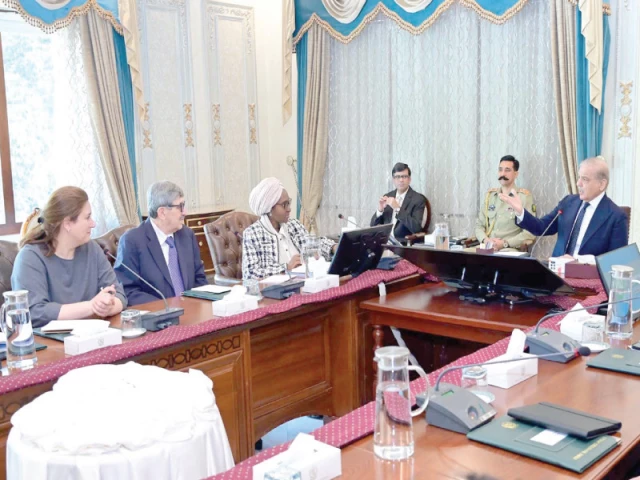PM seeks WB's help for priority reforms
Nine-member BoD delegation calls on Shehbaz PM desires support for anti-corruption agenda Investment, privatisat

Prime Minister Shehbaz Sharif has sought the World Bank board's support for engaging highly qualified foreign consultants to implement his anti-corruption and privatisation agenda, as the directors enquired about Pakistan's economic reforms plan.
The prime minister met with a nine-member delegation of World Bank's executive directors here on Monday. The delegation is currently visiting Pakistan, overseeing portfolios of various countries within the World Bank.
The delegation included Pakistan's outgoing Executive Director to the World Bank Dr Tauqir Shah who would be joining the government soon. During the meeting, Shehbaz expressed his desire to acquire the World Bank Group's technical support.
The prime minister expressed his desire to get the World Bank Group's support for engaging high-quality consultants to implement his agenda of eliminating corruption and bringing transparency, besides privatisation and digitisation of the economy.
Officials said that the visiting directors asked questions about the power sector reforms, increasing investment, privatisation of the power sector and reducing the high cost of electricity. The Pakistani authorities briefed about the multi-pronged strategy to reduce the tariffs.
They cited measures, including privatisation and the other steps the government had taken. The residential and commercial electricity prices ranged from Rs65 to Rs70 per unit, while the industrial tariffs were also quite high compared to the regional countries.
Some of the directors asked about the government's plan to boost the investment and the fiscal relations between the federal and the provincial governments. The country's investment-to-GDP ratio fell to a 50-year low in the last fiscal year.
The directors enquired about the government's programme for privatisation of the power distribution companies. The government is still at the infancy stage of the privatisation of the power distribution companies but hopes to mature a transaction by the end of the year.
In its his first year in office, the government could not privatise any state-owned enterprise and the first serious attempt to sell 60% stakes of the Pakistan International Airlines (PIA) also fell apart.
The International Finance Corporation (IFC) an arm of the World Bank has provided technical support for the outsourcing of Islamabad International Airport. The cabinet last week rejected a foreign bid for the outsourcing of the Islamabad airport and decided to begin the process afresh. The IFC, a few days ago, requested Finance Minister Muhammad Aurangzeb to engage it for the outsourcing of the Jinnah International Airport, Karachi.
Prime Minister Shehbaz told the delegation that Pakistan had greatly benefited from its partnership with the World Bank, which also provided substantial assistance to the people affected by the 2022 floods.
Last month, the Washington-based lender approved a $20 billion tentative financing package for Pakistan over a period of 10 years. The disbursements are linked to the achievement of the targeted outcomes in six sectors.
Shehbaz Sharif said that Pakistan's institutional and economic reform programme was moving rapidly. "The country's economy is on the right path and moving towards growth," a press release by the PM's Office quoted him as saying.
He stressed that sustainable economic development required further efforts. He said the credit for economic turnaround went to the hard work of the government's economic team.
The prime minister observed that Pakistan's exports and remittances were increasing; adding that reduction in the interest rate was boosting investment in the production sector.
The prime minister said that the government was introducing transparency in the system to control corruption. Digitisation remained a priority in the Federal Board of Revenue (FBR) reforms, he reiterated.
An Executive Director also raised a question about the tax-to-GDP ratio of the country. The prime minister stated that the Special Investment Facilitation Council (SIFC) had been created, involving all stakeholders, to ensure an attractive environment for investment in Pakistan.
The delegation also held separate meetings with the economic affairs minister and the planning minister. Ahsan Iqbal briefed the delegation about plans to boost the economy, "To pay for imports, we need to earn dollars, and to achieve this, we must focus on developing export potential in key sectors."
He identified eight critical areas for development: agriculture, industry, service sector, IT, manpower export, mining, blue economy, and creative industries. The planning minister underscored the urgency of increasing Pakistan's exports to $60 billion in the next 5 years.
However, the Pakistan Business Council said a few days ago that the government's decision to increase the gas prices for the in-house power generation had made the $60 billion export target unrealistic.



















COMMENTS
Comments are moderated and generally will be posted if they are on-topic and not abusive.
For more information, please see our Comments FAQ